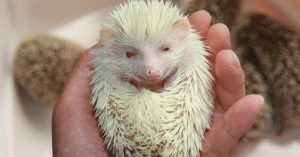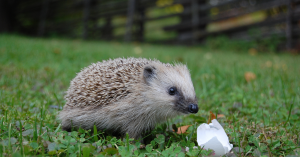The question which arises here is do hedgehogs have teeth? Yes, but Oral hygiene is often neglected with almost all animals. Not only it is always ignored but it is out of sight too. So how many parents visit a vet regularly? So until a problem is identified we are left alone.
Dental awareness and care are needed for hedgehog teeth. It is very common for a hedgehog to experience mouth spores that can go down sharply in an emergency. In this article, we will cover some important things that you must know.
The Actuality Of Hedgehog Teeth:
Hog starts cutting its “milk teeth” within 18 to 23 days after it is born. Milk teeth are also known as baby teeth. Most of the time, hedgehog’s parent don’t realize that their old teeth fall off and their place is taken by permanent teeth. Usually, there are 36 to 44 permanent teeth in the adult hedgehog.
The hedgehog’s teeth are just like human teeth which consist of molar, premolar, incisor, and canines. A hedgehog starts losing its baby teeth and grows its permanent teeth around the seventh to nine weeks. Baby teeth are so tiny that they are usually eaten by your hedgehog unless you are aware of it.
Now you realize that if you are enough lucky to find one of the baby teeth of your hedgehog, you are bound to be a hog tooth fairy. You must exchange teeth for many insects and other appropriate treatments.
Symptoms of Hedgehog Dental Problems:
There are often two clues to the story of a hedgehog having a dental problem. First of all, your hedgehog may feel difficulty in chewing or may completely avoid chewing because they have a mouth sore. Second, there may be swelling in the mouth of a hedgehog. Swelling may be in the gums lips, chin or upper area, or jawline.
Some of the other symptoms of dental problems are bad breath, weight loss, kneeling, rubbing jaws against objects, and sometimes blood around the mouth can be the cause of teeth issues of the hedgehog. If you notice one or more of these symptoms we strongly recommend you to see a qualified medical professional as soon as possible.
Oral Obstacles With Hedgehog Teeth:
Ordinary dental problems:
The major dental problem of hedgehogs begins when the parents of hedgehogs find that the adult teeth have fallen out. Hedgehogs like a human can produce plaque and tartar buildup. If this continues for a longer time, it can be the cause of gingivitis. It is a kind of periodontal disease but luckily it does not cause tooth decay. When this disease is left untreated, it can lead to periodontitis.
There could be another reason for tooth loss but unfortunately, it is often incurable. When there is abnormal cell growth in the mouth of a hedgehog, then this problem is called neoplasm and this problem often leads to cancer. Invasive squamous cell carcinoma is a disease that occurs when cancer is found in the oral cavity of the hedgehog.
Would that! We could provide you with a miraculous cure for this disease if it is the fate of your hedgehog. Honestly saying, we cannot. We can just recommend you if you love your hedgehog, send them over the rainbow before it hurts.
Protection Of Hedgehog Teeth At Home:
Is taking care of a hedgehog hard? No, it’s very easy. The chances of dental diseases of hedgehogs can be reduced and oral hygiene of hedgehogs can be improved by following the homemade remedies. Taking care of a hedgehog at home is very easy and simple. You just have to be sure that you are providing all comforts to your hedgehog. We will briefly describe each of the topics and give you some suggestions to make it as easy as possible.
Examining The Chew Pattern And Mouth Of Your Hedgehog:
Assessing the health of their teeth by examining the inside of your hedgehog’s mouth puts you far beyond surprising oral worries. When a toothache causes a lump to appear outside the mouth the infection increases. When you periodically check the inside of your mouth, you get to know about any plaque and tartar build-up before the infection becomes a nuisance.
If your hedgehog doesn’t allow you to see inside his mouth from time to time, the next best thing is to look at his chewing pattern. Here we are going to explain why WIFI cameras are necessary on your hedgehog. If your focus is on the food dish and you watch for a few minutes every day, you will no doubt that their chewing pattern changes or that they are just abstaining from food. This can be a great sign that something is going wrong. We also have used 5 Wyze cameras and the consequences were best and incredible.
Prefer Crunchy Food Over Soft Food:
A time comes when it becomes necessary to feed your hedgehog with soft food. Crunchy kibble can cause a serious problem to the gums of hedgehogs if the hedgehog has already lost many teeth. In this case, vets often recommend soft cat food. On the other hand, if your hedgehog is young and has healthy teeth they should eat crunchy cat kibble as we suggest here.
There a great benefits of crunchiness plaque and tartar build-up can be reduced by crunchiness and oral hygiene levels can also be increased by eating crunchiness. It’s like a certain food that is so hard and it hurts instead of helping. So our suggestion here is that you must avoid such kind of food.
Metal Drip Bottles Are Strictly Prohibited:
A water bottle containing a metal straw is something that hedgehog often breaks their teeth on. Ask someone to whom the hedgehog bites. Their jaws are very strong. As water bottles pose a risk not only to their teeth but also to their eyes we strongly recommend that you should avoid using them.
Clean Hedgehog’s Teeth Regularly:
Hedgehog brush is commonly used to clean teeth. Although this may sound strange you can brush your hedgehog’s teeth. Avoid using a human’s toothpaste as it cannot be swallowed and also it would not be tasty for a hedgehog. This can be done by brushing your hedgehog’s teeth, as shown by Instagram fame Darcytheflyinghedgehog!
Only if you possess the accurate paste and brush. A cotton bud is a substitute for a hedgehog toothbrush. If you choose this way you just have to ensure that your hedgehog does not try to eat the flavored toothpaste with a stick.
Hedgehog’s Teeth Care By Vets Through Oral Hygiene:
Hedgehog mouth often suffers from very serious diseases. Hedgehog’s teeth should be cleaned by a veterinarian from time to time. But this process is quite dangerous. To perform this task, the vet needs to keep the hedgehog under anesthesia, in which there is a certain amount of danger.
We suggest that if you are already undergoing a hedgehog procedure that requires anesthesia, talk to your doctor about examining and cleaning your hedgehog’s teeth. Relying on the complication of the situation your hedge is going through, your vet may not find it wise.
But if this can be done safely, it is better to reduce the risks of anesthesia with a single session than with multiple sessions. Hedgehog problems include swelling of their jaws too so it’s important to visit the vet from time to time.
Final Thoughts On Hedgehog’s Dental Care:
Being unique and different pets from cats and dogs, hedgehogs require more attentiveness from their parents. We hope that we have successfully described all the health issues related to a hedgehog.
FAQs:
Q1: What do you need to take care of a hedgehog?
Taking care of the hedgehog is very important and you need supplies for this purpose. Supplies include a water bowl, food, an enclosure, and a wheel. Toothbrush and body wash are also considered very essential.
Q2: How hard is it to take care of a hedgehog?
Hedgehogs being solitary animals need special attention. There are only a few hedgehogs who love to interact with people while most hedgehog likes to stay alone. It’s very easy to take care of hedgehogs.
Q3: How many teeth do hedgehogs have?
The average hedgehog has 34–44 teeth. However, young hedgehogs, known as hoglets, are not born with all 44 teeth since they are diphyodont like people and dogs. Hedgehogs usually have the following dental formula: Incisors 3/2; Canines 1/1; Premolars 3/2; Molars 3/3.







